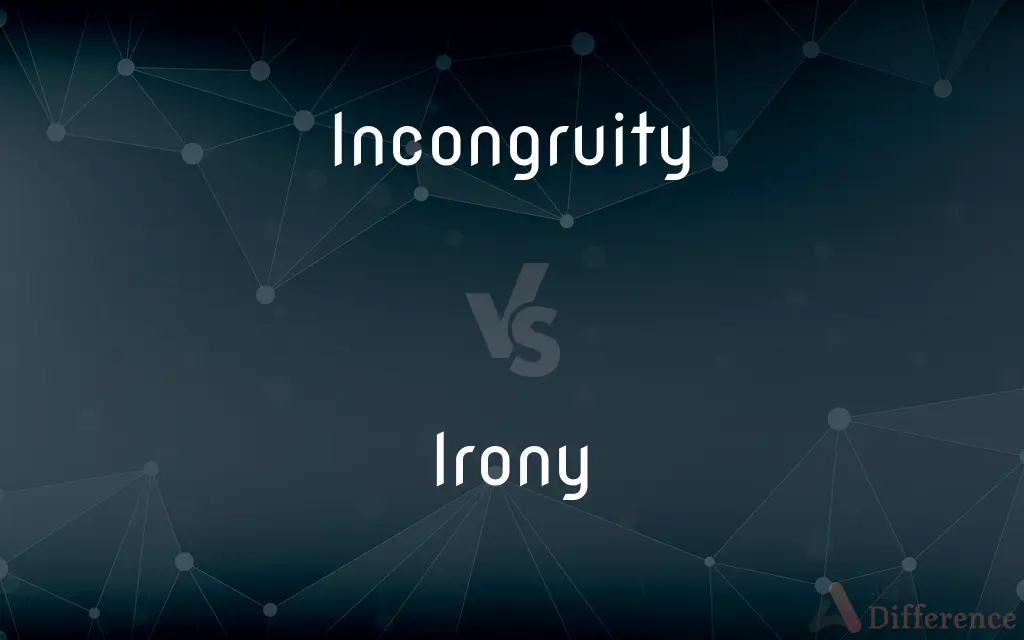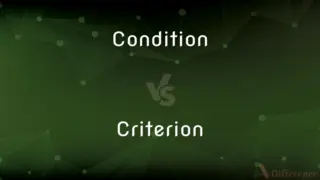Incongruity vs. Irony — What's the Difference?
Edited by Tayyaba Rehman — By Maham Liaqat — Updated on May 10, 2024
Incongruity involves inconsistency or lack of harmony between elements, while irony primarily denotes a situation where the outcome is opposite to what is expected.

Difference Between Incongruity and Irony
Table of Contents
ADVERTISEMENT
Key Differences
Incongruity often appears in situations or narratives where elements do not match expected norms or patterns, which can create a sense of surprise or confusion. Whereas, irony specifically exploits the contrast between expectations and reality, often to convey humor or emphasize a point.
Incongruity can be purely situational, without any implied commentary or deeper meaning, such as a formal dress at a casual party. On the other hand, irony, especially verbal irony, involves a speaker saying one thing but meaning another, often in a subtle critique.
Incongruity may be visual, like clashing colors in artwork, which directly impacts the viewer's perception. Whereas irony often requires a deeper understanding of context, expectations, and outcomes, relying more on cognitive recognition than immediate sensory detection.
Incongruity can arise unintentionally in everyday scenarios, such as mismatched clothing. While, irony often is used deliberately in literature, speeches, and films to add layers of meaning.
Incongruity can exist as a standalone concept without relying on the observer's awareness of the norm. In contrast, irony typically depends on the audience's knowledge of what is expected to fully appreciate the irony.
ADVERTISEMENT
Comparison Chart
Definition
Lack of harmony among elements
Expression signaling opposite of literal meaning
Intent
Not necessarily intentional
Often intentional to convey critique or humor
Dependency on context
Less reliant on external contexts
Highly dependent on contextual understanding
Common usage
Visual arts, everyday mishaps
Literature, speeches, sarcastic remarks
Effect on the observer
Immediate perception of mismatch
Requires cognitive engagement for full effect
Compare with Definitions
Incongruity
A mismatch that causes confusion.
The movie's plot had several incongruities that puzzled the audience.
Irony
Irony as a literary technique to enhance depth.
The irony in the novel added a layer of sophistication to the plot.
Incongruity
Visual or thematic clash.
The incongruity between the siblings was evident in their contrasting styles.
Irony
Situational irony where the outcome is opposite to expectations.
A fire station burning down is an example of irony.
Incongruity
Discrepancy in expected norms.
His polite demeanor was an incongruity in the raucous crowd.
Irony
Dramatic irony, where the audience knows more than the characters.
In horror films, irony is when the audience knows the killer is in the house but the character does not.
Incongruity
Something that is out of place.
Wearing a clown costume to a funeral is an incongruity.
Irony
Use of words to convey a meaning that contradicts the literal meaning.
Oh great, another flat tire, she said with irony.
Incongruity
Lack of harmony between parts.
The incongruity of modern furnishings in a colonial house was striking.
Irony
Saying the opposite of what is meant, often to mock or criticize.
Calling a slow-moving person Speedy is an example of irony.
Incongruity
Lack of congruence.
Irony
Irony (from Ancient Greek εἰρωνεία eirōneía 'dissimulation, feigned ignorance'), in its broadest sense, is a rhetorical device, literary technique, or event in which what on the surface appears to be the case or to be expected differs radically from what is actually the case. Irony can be categorized into different types, including verbal irony, dramatic irony, and situational irony.
Incongruity
The state or quality of being incongruous.
Irony
The use of words to express something different from and often opposite to their literal meaning.
Incongruity
Something incongruous.
Irony
An expression or utterance marked by a deliberate contrast between apparent and intended meaning
"the embodiment of the waspish don, from his Oxbridge tweeds to the bone-dry ironies of his speech and prose" (Ron Rosenbaum).
Incongruity
The state of being incongruous, or lacking congruence.
Irony
Incongruity between what might be expected and what actually occurs
"Hyde noted the irony of Ireland's copying the nation she most hated" (Richard Kain).
Incongruity
An instance or point of disagreement
Irony
An occurrence, result, or circumstance notable for such incongruity
The ironies of fate. See Usage Note at ironic.
Incongruity
A thing that is incongruous.
Irony
Dramatic irony.
Incongruity
The quality or state of being incongruous; lack of congruity; unsuitableness; inconsistency; impropriety.
The fathers make use of this acknowledgment of the incongruity of images to the Deity, from thence to prove the incongruity of the worship of them.
Irony
Socratic irony.
Incongruity
Disagreement of parts; lack of symmetry or of harmony.
Irony
(rhetoric) The quality of a statement that, when taken in context, may actually mean something different from, or the opposite of, what is written literally; the use of words expressing something other than their literal intention, often in a humorous context.
Incongruity
That which is incongruous; lack of congruity.
Irony
(countable) An ironic statement.
Incongruity
The quality of disagreeing; being unsuitable and inappropriate
Irony
Dramatic irony: a theatrical effect in which the meaning of a situation, or some incongruity in the plot, is understood by the audience, but not by the characters in the play.
Irony
Socratic irony: ignorance feigned for the purpose of confounding or provoking an antagonist.
Irony
(informal){{cite-journal
Irony
Of or pertaining to the metal iron.
The food had an irony taste to it.
Irony
Made or consisting of iron; partaking of iron; iron; as, irony chains; irony particles; - In this sense iron is the more common term.
Irony
Resembling iron in taste, hardness, or other physical property.
Irony
Dissimulation; ignorance feigned for the purpose of confounding or provoking an antagonist.
Irony
A sort of humor, ridicule, or light sarcasm, which adopts a mode of speech the meaning of which is contrary to the literal sense of the words.
Irony
Witty language used to convey insults or scorn;
He used sarcasm to upset his opponent
Irony is wasted on the stupid
Satire is a sort of glass, wherein beholders do generally discover everybody's face but their own
Irony
Incongruity between what might be expected and what actually occurs;
The irony of Ireland's copying the nation she most hated
Irony
A trope that involves incongruity between what is expected and what occurs
Common Curiosities
Can irony exist without prior knowledge?
Irony usually requires some background knowledge or awareness of norms to be fully appreciated.
What is the primary difference between incongruity and irony?
Incongruity is about elements not matching, while irony involves outcomes or meanings that are opposite to what is expected.
Is irony always humorous?
No, irony can be used for dramatic effect or criticism, not just humor.
How does one identify irony in conversation?
Irony in conversation often involves tone and context; it may sound sincere but means the opposite.
Can irony be found in everyday life?
Yes, especially in situations where things turn out drastically different from what was expected.
Can incongruity be unintentional?
Yes, incongruity can occur without intent, simply due to mismatched or out-of-place elements.
What is an example of irony in history?
Events like the Titanic, deemed "unsinkable," tragically sinking on its maiden voyage.
Is there a cultural dimension to understanding irony?
Yes, different cultures might interpret or use irony in varying ways.
Can irony be misinterpreted?
Frequently, especially if the audience misses the contextual clues.
Is incongruity applicable in literature?
Yes, but it's more about elements within the story that don’t fit together rather than the narrative techniques that irony employs.
How does dramatic irony function in film or theater?
It creates tension or humor by letting the audience in on secrets that characters don't know.
What makes incongruity apparent in visual arts?
It's often immediate and visual, such as unexpected combinations in a painting.
Does incongruity involve deception?
Not necessarily, as it does not require the deliberate manipulation of expectations like irony.
What are common mistakes people make about incongruity?
Confusing it with irony, when it simply refers to things that don’t quite fit together without implying the opposite meaning.
How can incongruity affect humor?
It can be a source of humor through unexpected or absurd juxtapositions.
Share Your Discovery

Previous Comparison
Radical vs. Extremist
Next Comparison
Condition vs. CriterionAuthor Spotlight
Written by
Maham LiaqatEdited by
Tayyaba RehmanTayyaba Rehman is a distinguished writer, currently serving as a primary contributor to askdifference.com. As a researcher in semantics and etymology, Tayyaba's passion for the complexity of languages and their distinctions has found a perfect home on the platform. Tayyaba delves into the intricacies of language, distinguishing between commonly confused words and phrases, thereby providing clarity for readers worldwide.
















































